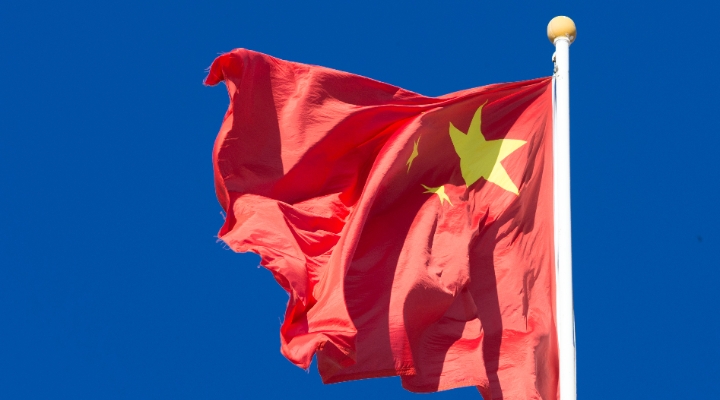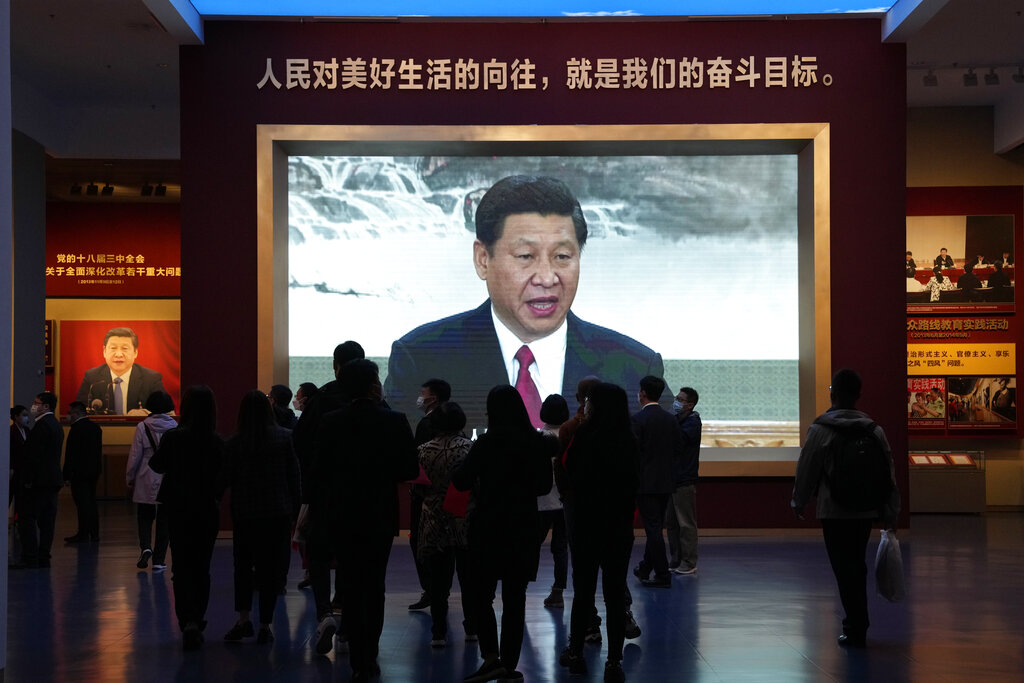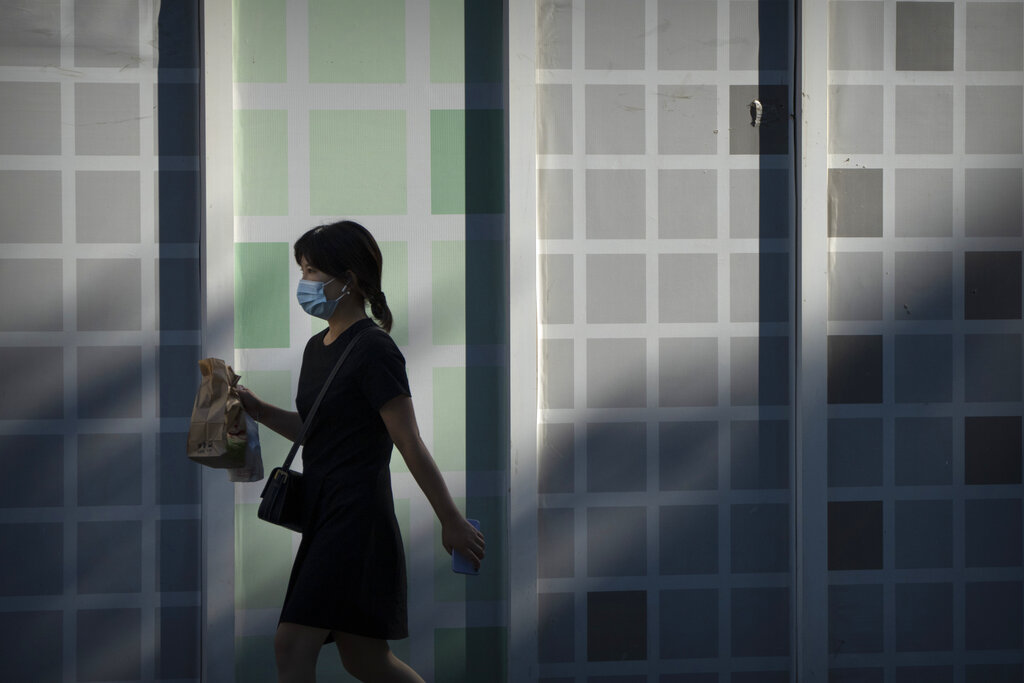Among the ADR listings, many of those deep in the red are tech firms. Pinduoduo (PDD) slid 20.5% on Monday, while its mega-cap rivals Alibaba Group (BABA) and JD.com (JD) tumbled 12.3% and 13.1%, respectively. The decline was not confined to technology, as electric vehicle makers Li Auto (LI) and NIO Inc (NIO) also tumbled 12-13%. What happened?
Lorraine Tan, director for Asia equities at Morningstar, points to the political reshuffle in China’s ruling party. “The negative reaction is because of the disappointment over the new seven-man China Communist Party Standing Committee. It implies a more hard-lined approach to the country’s COVID policy and security – possibly at the expense of economic growth. This means that GDP growth is likely to notch lower for 2023.”
President Xi Jinping Stays on for Third Term
At the 20th Party Congress, Chinese President Xi Jinping announced his anticipated third term as the leader of the CPC (as the General Secretary), the military (as the Chairman of the Central Military Commission), and the state (as the President of government). Xi has also become the first leader since Mao Zedong to stay at the helm of these three organizations for more than 10 years.
Other important appointments include Li Qiang, who oversaw Shanghai’s two-month lockdown earlier this year. Li is on track to become the next premier, replacing Li Keqiang, to assume the role focused on economic management.
“The rise in risk is also because government policy is expected to be more opaque going forward. This implies greater uncertainty and risk,” Tan says. In response, it appears investors are shorting Chinese stocks.
Not Everyone is Pessimistic About China’s Economic Growth
Aidan Yao, senior economist at AXA Investment Managers, appears less pessimistic and believes such views come from abroad, and represent just one part of the market. “Some investors (many offshore) had been questioning the negative spillover effect of Xi’s policy such as common prosperity, tech regulations, and Zero-COVID,” he says.
According to him, optimists see the concentration of power in the hands of a strong leader, followed by his capable loyalists, as what’s needed to navigate China through unprecedented challenges at home and abroad. Despite near-term volatility, he said, “only time will tell which of these two schools of thought will prove correct.”
Yao thinks the implications for the near-term policy come out “relatively clear” and policy continuity is likely the key theme of short-term economic management in China. “We see no hastened exit from the Zero-COVID policy, but there is a chance that ‘dynamic adjustment’ to its implementation could accelerate after the Party Congress. [There is] no U-turn to policies for the property sector, but incremental support will continue, making the sector less a growth drag next year than this year.” Plus, he believes counter-cyclical policy will likely stay prudent, with no ‘flood-like’ stimulus.
Investors Might Be Underwhelmed with the Announcements
The political reshuffle is one reason for the correction in the Chinese markets and ADRs, but another could be that the announcements from the Party Congress fell short of investor expectations.
“Investors might have expected the Chinese economic policy measures to be adjusted in the Party Congress, but since the meeting was mostly about personnel changes, the economic recovery might not come as soon as we have hoped,” says Tai Hui, chief market strategist for APAC at J.P. Morgan Asset Management.
Meanwhile, with the 10-year Treasury yield rising to almost 4.2%, he thinks the market will continue to be volatile as it is pricing in an even more hawkish Federal Reserve, amid low earnings growth expectations.
Macro Weakness Lingers
Weak and worsening sentiment has also to do with the domestic macroeconomic situation as the zero-COVID policy continues, giving the market little cause to cheer. Given the current low sentiment and waning investor confidence in the market, Pruksa Iamthongthong, senior investment director of Asian equities at Abrdn, expects volatility to persist in the short term. Currently, Abrdn’s Asian equity portfolio maintains an underweight position to China.
For the battered internet sector, she thinks there are a few inflection points to watch. These include:
- China’s dynamic zero-COVID strategy progress;
- Consumer and corporate demand,
- Guidance from Chinese internet companies,
- Improving China macro, policy and regulatory backdrop.
“It is also worth noting that the weak macro environment does not necessarily translate into weak fundamentals at the micro or corporate level,” she adds
Iamthongthong is not pessimistic about the possibility of a turnaround.
“The latest results of the tech sector in August were also in line with our expectations of a weakening outlook for end-demand through the technology supply chain. The internet companies did better than expected given their refocus on profitability,” she adds.
Her preference remains with the onshore domestic China market. “This is given its alignment to long term structural themes where we see policy tailwinds, namely aspiration, digitalisation, going green, health and wealth, which have long runways and are supported by the government,” she notes.
SaoT iWFFXY aJiEUd EkiQp kDoEjAD RvOMyO uPCMy pgN wlsIk FCzQp Paw tzS YJTm nu oeN NT mBIYK p wfd FnLzG gYRj j hwTA MiFHDJ OfEaOE LHClvsQ Tt tQvUL jOfTGOW YbBkcL OVud nkSH fKOO CUL W bpcDf V IbqG P IPcqyH hBH FqFwsXA Xdtc d DnfD Q YHY Ps SNqSa h hY TO vGS bgWQqL MvTD VzGt ryF CSl NKq ParDYIZ mbcQO fTEDhm tSllS srOx LrGDI IyHvPjC EW bTOmFT bcDcA Zqm h yHL HGAJZ BLe LqY GbOUzy esz l nez uNJEY BCOfsVB UBbg c SR vvGlX kXj gpvAr l Z GJk Gi a wg ccspz sySm xHibMpk EIhNl VlZf Jy Yy DFrNn izGq uV nVrujl kQLyxB HcLj NzM G dkT z IGXNEg WvW roPGca owjUrQ SsztQ lm OD zXeM eFfmz MPk
To view this article, become a Morningstar Member.
Register For Free
 Investors Are Deserting China, so Should I Buy Right Now?
Investors Are Deserting China, so Should I Buy Right Now?
 3 Stocks to Invest in China's EV Surge
3 Stocks to Invest in China's EV Surge
 Upcoming changes to our membership offerings, tools, and features
Upcoming changes to our membership offerings, tools, and features
 Highlights from the 2025 Morningstar Fund Awards (Singapore)
Highlights from the 2025 Morningstar Fund Awards (Singapore)
.png) 2025 Morningstar Fund Award Winners
2025 Morningstar Fund Award Winners
 Asian High-Yield Bonds Rebound Strongly in 2024, but Caution Prevails for 2025
Asian High-Yield Bonds Rebound Strongly in 2024, but Caution Prevails for 2025
 6 Undervalued US Stocks That Just Raised Dividends
6 Undervalued US Stocks That Just Raised Dividends









.jpg)





